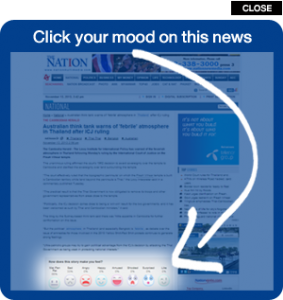
BANGNA — The global decline in the traditional news industry, once considered inevitable, appears to have been completely and permanently reversed by the innovative addition of a “Mood Meter” on the website of the Nation, Bangkok’s second-largest English-language press.
By allowing users to click on a selection of faces ranging from “Happy” to “Angry” to “Mai Pen Rai” after reading each article, the Nation has tapped into an entirely new paradigm of news consumption, interactive online experiences, and viral engagement with its consumer base — and in doing so, has revitalized the news industry and instantly catapulted newspapers to the very top of the media world.
“It seems so obvious in hindsight, but what newspapers were really missing all this time was a way for readers to express how they felt about the news, but in a fun way,” said Miles Van Der Haussen, a senior media analyst at the Pew Research Center. “All this focus on trying to make newspapers more sexy, or more interactive, or easier to read was a dead end. People want to click smiley or frowney faces. It’s just human nature.”
Since its introduction in September 2013, the Mood Meter has been directly credited with a 3500% increase in average clicks on every Nation article, and an overall jump of almost 4000% in the number of unique visitors to the Nation website, making it the number one website in Thailand, and one of the biggest websites in Asia, just behind Facebook and Google’s home page.
Of equal significance was the spike in the number of clicks on the banner ads that accompanied the new Mood-Metered stories.
“Once people could respond to a story by expressing “Shocked” or “Amused,” they were so satisfied with their news experience that they immediately bought something from our sponsors,” said Worapap Kritneroon, the Nation’s advertising manager.
Most incredibly of all, the print edition of the Nation has been sold out for months, leading to the newspaper tripling its printing numbers and doubling the newsstand price, as a grateful public expresses a new found loyalty to the newspaper that finally let them respond to news by clicking “Amused” in response to stories about Thai politics.
Advertising revenues are projected to increase by one-hundred and twenty-fold, erasing the entire debt load of the Nation Group in the next six months, and allowing the Nation newspaper to increase staff, update its equipment, and open a large international desk in Q2 of this year.
“We plan to buy several helicopters for live news coverage, and maybe lure some of the biggest names from CNN and BBC to come work for us,” said Sutachai Yoon, Chairman of the Nation Group. “Thanks to this Mood Meter, we should be able to pay for everything in cash.”

Surveys taken in Bangkok by Thammasat University show that the Mood Meter has a 99% approval rating from users, with almost all surveyed saying that clicking on cartoon faces made their news experience “completely different.” Additionally, over 85% surveyed spoke highly of the range of emotions that could be expressed by the eight mood choices, and almost 70% loved the way the Mood Meter followed you as you scrolled down a story on your smart phone, persistently reminding you of its intrusive presence.
In the wake of the Mood Meter’s success, newspapers around the world have quickly jumped on the bandwagon and imitated the Nation’s groundbreaking innovation. The New York Times has introduced a “Mood Menu,” while the Wall Street Journal launched its “Feely Faces” just after the new year. The Economist is expected to introduce its own version, “Mr Mouth,” featuring a selection of cartoon characters with giant mouths, sometime next month.
According to media analysts, the widespread introduction of clickable faces on news stories could increase the global newspaper industry’s revenue by USD 34 billion this year alone, accompanied by a spike in consumers in the coveted young urban demographics.
The Mood Meter is widely expected to win a Pulitzer Prize, and there are whispers that a special Nobel prize is being considered for its revolutionary effects. But despite receiving accolades from grateful peers and being lauded around the industry as its savior, the Nation says it has no plans to patent the Mood Meter.
“The Nation has always been on the forefront of innovation, and we are happy to contribute to our industry,” said Sutachai Yoon. “In the future, and in the annals of journalism history, the Nation name will forever be associated with the Mood Meter. That’s all we could ask for.”


